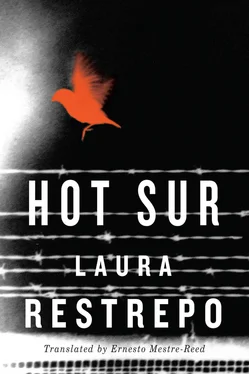At that same time, in another corner of the city, I was freaking out knowing nothing about what had happened to her. And it would be another seven weeks before my uncertainty was eased when I received a Facebook message from Juanita one Saturday morning. The message said, “Two little ducks in front of Dorita.” Shit, it was not an easy message to decode. Two little ducks in front of Dorita. That’s it. Could it be referring to the duck pond in Central Park? The offices of the Ugly Duckling Presse on 3rd Street in Brooklyn, because I had once told the class at Manninpox that I did some work for them? Or maybe the Peking Duck in Chinatown? Nothing made much sense until a bell went off. The “two ducks” could very well be Colombian slang for the number 22, the shape of which resembles two ducks waddling to the left. So maybe it was not code for a place but for the time, twenty-two hundred hours, or 10 p.m. “At Dorita’s” was much easier to figure out. There was only one Dorita who was known to us. María seemed to want to meet at 10 p.m. at Forbidden Planet, where I was going to take her the night of our reunion to show her the series of my graphic novels, The Suicide Poet and His Girlfriend Dorita , before Sleepy Joe changed things. If it wasn’t that, then I had no clue what it could be. A date maybe? I started thinking maybe it made more sense that it was a date. The 22nd of this month? No, it had to be the time. Forbidden Planet at 10 p.m.? But then on what day? The next day, a Saturday, I waited for her there from 9:30 p.m. to midnight. She didn’t show up then, or on Sunday, or Monday. On Tuesday, I was running late, and when I arrived there at 10:20 p.m., I thought I saw her at the front door. But the woman was wearing a strange cap pulled down to her eyes and the rest of her face was under a scarf, so it was only when I was very close to her that I knew it was indeed her. I had already decided that I would hide her in the house in the mountains; it was, for the time being, the best option. I had to get her out of the city, because they would be looking for her with a magnifying glass in places where you needed your identification documents and were reported for the slightest suspicions. God forbid she had tried in desperation to check into a hotel. I didn’t even ask her. There was no time for debates. I simply signaled that she climb behind me on my bike and took off. I only revealed our destination when we were already on the way. Her response was to ask where it was, and didn’t know whether to laugh or cry when I told her it was just down the road from Manninpox.
I’m not quite sure how to explain what’s happened since that night. Let’s just say we’re living as if in a dream, the two of us hidden in the attic, making do with things as if we are two kids in a tree house because we couldn’t care less about what is happening in the world below that is bristling with dangers. We shit on those dangers for now. And the dangers shit on us, stuck in that attic of the house like ants after a fumigation.
All the powers of the state are set against María Paz, and I’m still a little puzzled how this charming girl has become the bull’s-eye of so many pissed-off macho men — agents of the CIA and the DEA, migrant and bounty hunters, and a posse led by the vermin Sleepy Joe, who must have been howling in his cave because so many others were trying to snatch his prey. But María Paz has not wanted to talk about any of that. She does not bring up her past, much less her future. I think it is comforting to her to feel as if she is in a boat in the middle of a timeless sea. Once again, she and I are floating in the bliss of a period of “things go right.” Seven months ago we went through a similar ephemeral period that lasted only a couple of hours; then we passed through a very long and anguishing “things go wrong,” and now we have returned to the bliss of the good days.
Like any good graphic novel heroine, María Paz is complex; there are no predictable plots in her story. Everything is extraordinary, very intense, and at the same time so otherworldly and unreal, such as letting the days pass ignoring what has happened, purposely ignoring all the possible consequences, letting the world fall to pieces all around us. And that’s just a figure of speech. Symptoms are beginning to appear, a new phase of “things go wrong” has reared its ugly fucking head. Four days ago, a horrendous crime took place on this mountain. The victim was the man who brings us the bags of food for the dogs; it is something utterly indescribable, they didn’t only murder him, but they ripped off his face. The authorities are still searching for the suspects and have the area under twenty-four-hour patrol: a good thing on the one hand, because it reestablishes the sense of safety, and a bad thing on the other hand, because for us up here it make us recluses with much more claustrophobic force than before. Now it is clearer than ever that María Paz cannot as much as peek outside or the entire security operation would descend on the house. But I’ve decided not to tell her. What good would it do? For the moment, I see no reason to worry her. Up here, she is secure, free from any danger, ignorant of the mayhem outside that has everybody on edge. María Paz needs her rest. The important thing is that she recovers from the damage of what she has gone through, enjoys herself however she can, is pampered, eats a lot, sleeps as much as she needs to, and is left alone. So I keep the fears and conjectures to myself.
For now, I have no intention of letting this bubble of blind, deaf, exclusive, and self-sufficient happiness in which we both float burst. Because I’m on vacation, I don’t have to go anywhere. No one bothers us up in the attic and we are together twenty-four hours a day, seven days a week, with the exception of a couple of nights a week when I go down to have dinner with my father so as not to arouse suspicion. I return to the attic with a healthy portion of the meal. María Paz is effusive and generous when we make love, but I have not been able to get her to sleep in my arms. After we make love she turns the other way and curls in upon herself like a seashell, and I have to make do with the unconditional affection of Skunko, who has begun to sleep draped across both of us, and I resign myself to simply watch her for hours. I am astonished by her tendrils of black hair invading the pillows, and her long eyelashes silky as spider legs. I linger my gaze on the curve of her shoulder, on the protruding ears that she hates so much, on the soft splendor of her skin, the light hairs on her nape, the lapping waves of her breath, the white cotton panties that she wears, bigger than any other girl I have known — prison maxi panties, to be truthful, or more like orphanage maxi panties, that are far from sexy but still manage to turn me on, like everything about her. Now, I understand more profoundly what Boris Becker meant when he said that he only fully realized how dark-skinned his wife was when he saw her naked body on white sheets for the first time.
We never dare ask what is going to happen when we are brought down by force to face reality. When I asked her how she survived after fleeing from Bronx Criminal Division, she said that it was thanks to kind folks. She told me about the Peruvians she met at the cookout and a rich bachelor from Park Slope who allowed her to use his penthouse. She also recounted times when she panicked, lonely nights, times when she escaped just by a hair, about dangerous corners in some neighborhoods, and about a friend’s betrayal. There were also the two sisters who sold tamales from home and hired her to knead corn flour.
“I had never eaten so many tamales,” she said.
“Why didn’t you leave the country?” I asked the obvious question.
“Because of Violeta, my sister, Violeta, I can’t abandon her. I will not leave until I can take her with me.”
Читать дальше












